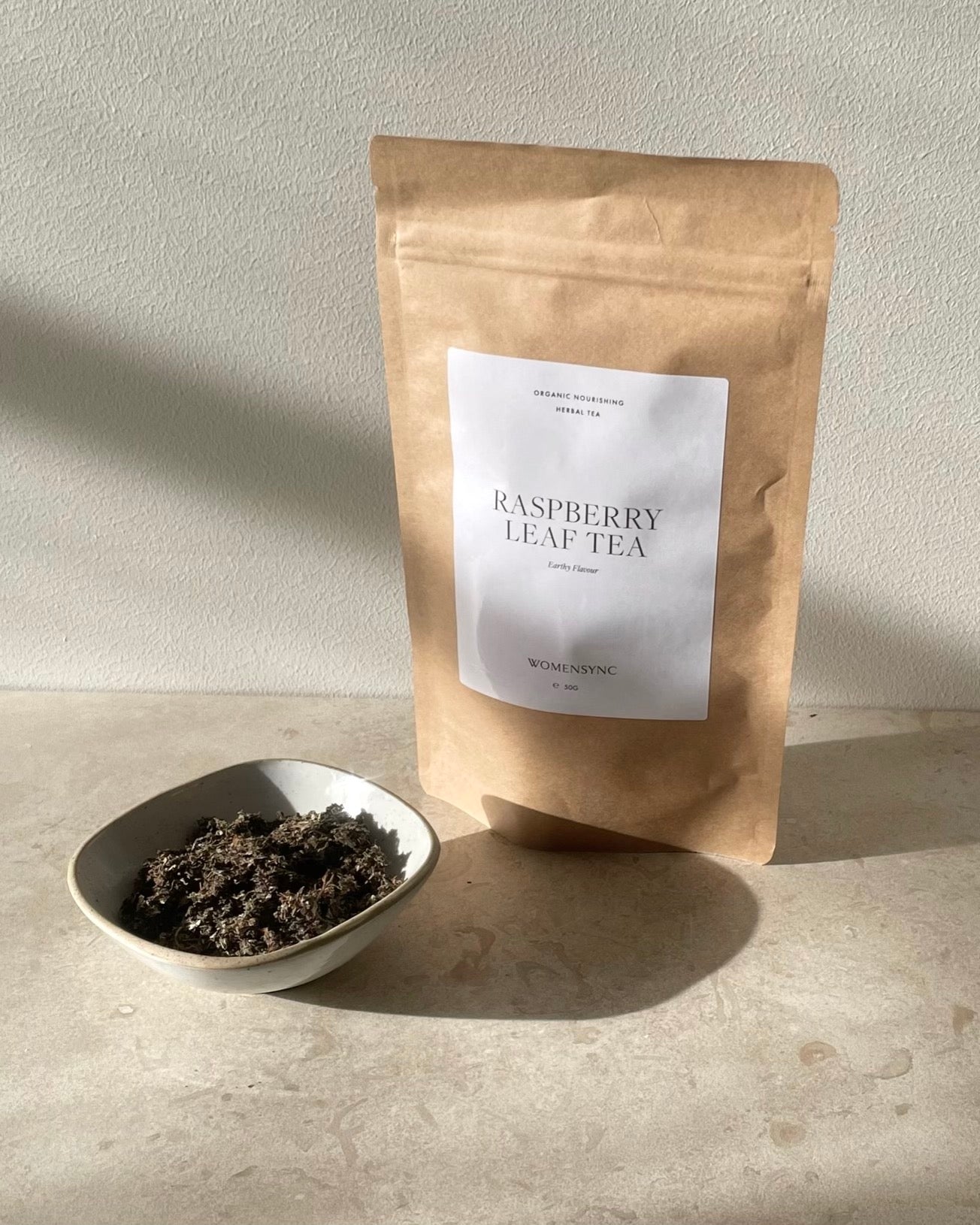This is a guest post by Samira Jabbar, who is a trained midwife and works as a midwife at a women's clinic in Stockholm.
Raspberry leaf tea has been recommended for decades in herbal medicine for women at various stages of life. In addition to the good taste of raspberry leaf tea, many benefits have been seen with the green leaves of the raspberry bush, not least for pregnant women where raspberry leaf tea is said to strengthen the uterus, which can make labor pains more effective. Many midwives testify to seeing a connection between the intake of raspberry leaf tea and spontaneous births without interventions such as using a suction cup.
What is Raspberry Leaf Tea?
Pregnant women have been drinking raspberry leaf tea for centuries to create more favorable conditions for childbirth. It has long been known that the pregnant woman should be able to use the tea as a preparation for the impending birth.
In addition to the raspberry leaves releasing oxytocin – a hormone that signals pleasure and calmness, these little green leaves also contain a variety of vitamins and minerals. Some of these vitamins are vitamin C, iron, vitamin E, calcium, vitamin A, magnesium, manganese and vitamin B complex (Parsons, 1999). Both vitamin C and iron are important components for the immune system, and calcium and vitamin A contribute to stronger bones and have a positive impact on the development of the unborn child. Fragarine is also a substance found in raspberry leaves that should be able to increase blood flow in the uterus and thus strengthen the muscle fibers in the uterus (Parsons, 1999).
Here you can read more about how you can prepare your herbal tea in the best way or make it into an Herbal Infusion . It is important not to pour boiling water over the raspberry leaf tea, as the oxytocin can be destroyed. The tip is therefore to heat the water to around 60-70 degrees.
Oxytocin
Oxytocin is produced in our brain and controls a number of vital functions. It is both a hormone and a neurotransmitter. Our body's own oxytocin is released, among other things, during touch but also during childbirth and has an important function when it comes to uterine contractions. Oxytocin controls both the strength and frequency when it comes to contractions and has a decisive role in how the course of labor turns out (The midwife's handling of normal labor, chapter 2 Obstetric anatomy and physiology p.19-32). Studies show that oxytocin also acts as a protection against stress and fear and provides an increased pain threshold (Dencker, 2016). Oxytocin can also be given in synthetic form, among other things an injection is given at most maternity clinics immediately after birth to counteract postpartum bleeding (Nordström, 2016).
Raspberry leaf tea as a preparation for childbirth
Much suggests that oxytocin has a decisive role during childbirth, so it is not entirely illogical that the influence of raspberry leaf tea on the musculature of the uterus can have a role. According to Parsons (1999), there is a link between the consumption of raspberry leaf tea and a reduced incidence of emergency caesarean sections, the use of suction bells and the performance of amniotomy. It has also been seen that the tea can also shorten the opening phase during childbirth (Parsons, 1999). The substances that the raspberry leaf tea contains are not only considered to strengthen the muscles of the uterus, but also to reduce the pain of after-labours. The astringent effect is also thought to reduce the risk of postpartum bleeding (Grouber, 2011).
An Australian study from 1999 with 108 participants showed that the group that drank raspberry leaf tea during pregnancy had a shorter latency phase. Another unexpected finding was that among those who drank raspberry leaf tea, there were fewer cases of amniotomy, emergency caesarean section and suction bell. A year later, the study was repeated with 192 participants and then it was found that it did not shorten the latency phase, but rather the opening phase by 9.59 minutes. The study did not show that raspberry leaf tea would be harmful to the pregnant woman or the fetus (Parsons et al., 1999).
The recommendation today is to drink 1-3 cups a day from week 36 + 0 (Simpson, 2001) but as a pregnant woman you should always consult your midwife before deciding to drink raspberry leaf tea.
In a 2021 systematic review, 13 studies published between 1941 and 2016 were studied. The review of the collected studies showed that raspberry leaves have been shown to have effects on animal and human smooth muscle, including the uterus. Among human studies, there is one study that showed a clinically meaningful (but non-statistically significant) reduction in the length of the second stage and enhancement of labor in women who ingested raspberry leaf, but it is generally believed that in human studies it has shown neither harm nor benefit . The conclusion reached was that the evidence base supporting the use of raspberry leaf during pregnancy is weak and further research is needed to address the issue of raspberry leaf effectiveness. (Bowman et al., 2021).
More research is needed, but there is no evidence that raspberry leaf tea is harmful. The side effects found in studies are that the tea has a laxative effect and can be mildly diuretic (Parsons, 1999). More extensive studies are required to provide definitive guidelines.
The Swedish Food Agency's advice regarding drinking large amounts of herbal teas regularly during pregnancy is based on the fact that there is insufficient research done on the subject (Livsmedelsverket, 2022).
Note: This blog post is for educational purposes. It is not intended to diagnose, treat or cure. If you have health problems, it is important to discuss them with an expert.
Glossary:
Afterbirth: when the uterus contracts after childbirth
Amniotomy: an intervention in which a hole is made in the amniotic membranes to allow the water to flow
Postpartum haemorrhage: bleeding after childbirth
Opening phase: the phase during labor where the cervix begins to open
References
Literature:
The midwife's handling of a normal birth, Helena Lindgren, Margareta Rehn, Ingela Wiklund, edition 2, 2019
Dencker, A (2016) Nursing to prevent slow labor progress. In Christensson, K., Dykes, AK., & Lindgren, H. (Eds.), Reproductive health: the midwife's area of expertise (p.545). Lund: Studentlitteratur AB.
Nordström, L (2016) Medical complications in women. In Christensson, K., Dykes, AK., & Lindgren, H. (Eds.), Reproductive health: the midwife's area of expertise (pp.612-619). Lund: Studentlitteratur AB.
Articles:
Gruber CW, O'Brien M. Uterotonic plants and their bioactive constituents . Plant Med. 2011 Feb;77(3):207-20. doi: 10.1055/s-0030-1250317. Epub 2010 Sep 15. PMID: 20845261; PMCID: PMC3407953.
Parsons M, Simpson M, Ponton T. Raspberry leaf and its effect on labour: safety and efficacy . Aust Coll Midwives Inc J. 1999 Sep;12(3):20-5. doi: 10.1016/s1031-170x(99)80008-7. PMID: 10754818.
Simpson M, Parsons M, Greenwood J, Wade K. Raspberry leaf in pregnancy: its safety and efficacy in labour . J Midwifery Womens Health. 2001 Mar-Apr;46(2):51-9. doi: 10.1016/s1526-9523(01)00095-2. PMID: 11370690.
Web:
https://fragor.livsmedelsverket.se/org/livsmedelsverket/d/hallonbladste-gravid-4l0y/

